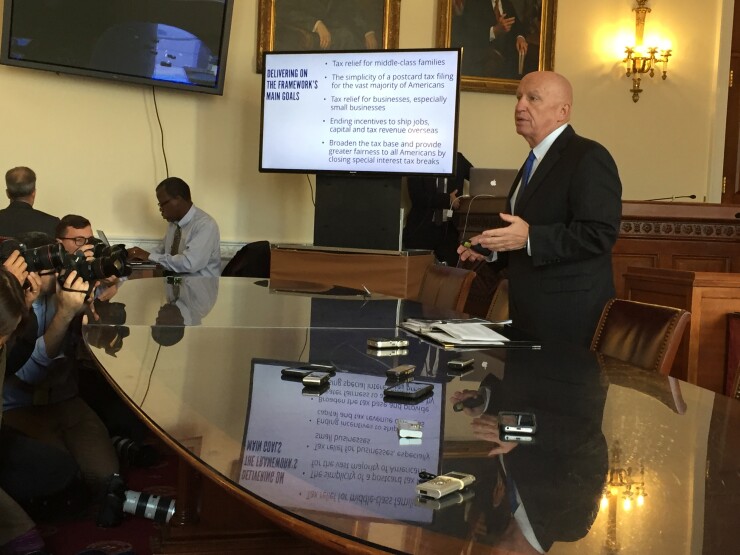WASHINGTON – The new House Republican tax reform bill unveiled today would put new limits on the federal deductibility of state and local taxes. It would limit the deductibility of property taxes to $10,000 annually while other state and local taxes would be deductible only for households with incomes under $400,000.
The mortgage interest deduction, another key component for households that claim the state and local taxes deduction, would be capped for future mortgage loans of $500,000. Current mortgages would be grandfathered.
Two other deductions claimed by some households – medical expenses and property and casualty losses – would also be eliminated.

The tax-exemption for municipal bonds would not be altered, but the desirability of munis as an investment would be diminished somewhat because the threshold for the 39.6% income tax rate would climb. Republicans propose raising it to $1 million from the scheduled 2018 threshold of $426,700 for individuals and $480,050 for married couples filing jointly.
Other changes in the plan include:
• Households would get a larger standard deduction of $24,000 for families and $12,000 for individuals. An average family of four earning about $59,000 would get a tax cut of about $1,100, according to Brady.
• Personal exemptions would be replaced with a $300 credit for adults and a larger credit tax credit of $1,600 instead of the current $1,000.
• Private activity bonds would be eliminated, though the tax exemption for other municipal bonds would remain under the House Republican tax reform bill, Ways and Means Committee chairman Kevin Brady, R-Texas. private equity bonds, which are widely used for financing multifamily and single family housing projects as well as, airport, water, sewage and other facilities.
• The plan would repeal the alternative minimum tax, which is currently applied to private equity bonds. The maximum tax rate that can be applied to the business income of small and family owned businesses conducted by sole proprietorships, partnerships and S corporations would be 25%.
• The corporate rate immediately would be reduced to 20% from 35%. The plan would allow businesses to immediately write off or expense the cost of new investments in depreciable assets other than structure for the first five years. Net interest expense incurred by C corporations would remain deductible for businesses of up to $25 million, but not for larger businesses.
Democrats are likely to propose restoration of private equity bonds and expansion of the use of municipal bonds during deliberations by the House Ways and Means Committee members next week.





